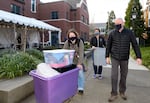University of Portland officials are emphasizing its stringent coronavirus precautions as more than 800 undergraduate students are set to move into campus housing this week, and the university is preparing for the start of a spring semester that offers a hybrid of in-person and online classes.
The university last week announced one of its staff members was Oregon’s first reported case of the new U.K. variant of COVID-19. UP said that person did not have any prior contact with students, and that case does not change its plans for the upcoming semester.
“Our robust testing protocols caught this infection early and worked as they should have. Our resources came together quickly to identify, isolate and care for this member of our UP community, and to address the possibility of further spread,” Michael Lewellen, UP Vice President for Marketing & Communications, said in a statement at the time. “We remain confident in our COVID-19 planning and management strategies. Opening of our spring 2021 semester with limited students in residence halls and a hybrid of online and select in-person classes will proceed as scheduled.”
The institution said in a news release earlier this week the entire enrollment of more 4,000 students is set to begin classes Monday, though most of those classes will still be conducted virtually.
The private university said it has partnered with the national healthcare provider, Carbon Health, to facilitate move-in testing, surveillance testing and daily symptom tracking. Ongoing screenings and monitoring will be based on the degree of “individual and group contact on campus among faculty, staff and students,” UP said in a statement Wednesday.

More than 800 undergraduate students are moving into on-campus housing this week at University of Portland.
University of Portland / University of Portland
Since Jan. 4, the university said it has tested almost 1,000 students. It has reported seven positive cases from that group.
It currently does not include students that self-report cases, or test results of faculty and staff in its data, but the university said it will begin to report all COVID-19 test results administered by the university, including faculty and staff, as the campus partially opens next semester.
“I have deep admiration for how our community members responded when unprecedented difficulties redefined our University’s operations last spring,” UP President Rev. Mark L. Poorman said in a statement. “Now, as a new semester begins, our energy and resources are focused on all that we can accomplish collectively as we continue to keep community members safe.”
As far as how move-in will look like for students this week, Lewellen told OPB that UP has spent several months de-densifying the residence hall footprints, so there are no more triple or quad rooms offered to on-campus students.
“Most students are in single-occupancy rooms,” Lewellen said. “Though to our surprise there were a number of students who requested (and were granted) a roommate.”
As part of the reconfiguration of residence halls, common areas were also eliminated to deter any sort of gatherings, Lewellen said.
Students will undergo rapid testing as part of their move-in process, according to Joe Kaleel with UP’s COVID-19 Management Team.
“That is their first step. They have to step into that clinic and do a rapid test, a molecular rapid test — which has a very high probability of accuracy, ” Kaleel said. “To proceed through the rest of the move-in they have to receive a negative test.”
If a student based locally tests positive, they’ll have the option of going back home for their isolation period, Kaleel said.
“We also have suites available here for people to isolate on campus if they just want to jump into the experience and get started living here on campus,” he said.
Regarding instruction, Lewellen said more than 30 UP faculty members volunteered to teach at least one spring semester class in-person. A total of 57 classes will be taught in-person during the spring semester. That compares to more than 1,500 virtual classes.
Lewellen said of those in-person classes, some will undoubtedly be lab-based classes, especially in the sciences and in UP’s School of Nursing, but the classes vary across academic subjects including the university’s Air Force and Army ROTC programs.
“Classrooms have been reconfigured to deliver safe social distancing, with protective, transparent shields at the front of the classrooms to protect instructors,” Lewellen said. “There is also a strict face mask policy that will be enforced whenever faculty, staff or students are in common or open areas, including classrooms.”
All buildings at the university, including classrooms, are cleaned and sanitized each evening after use, he said.
